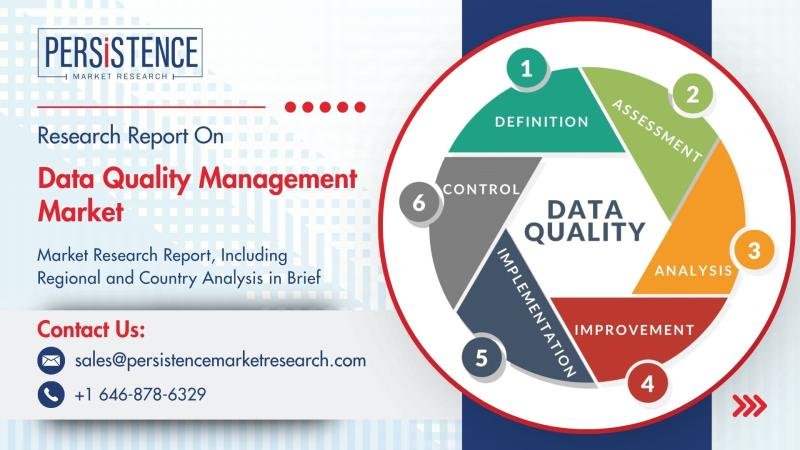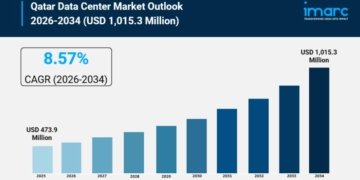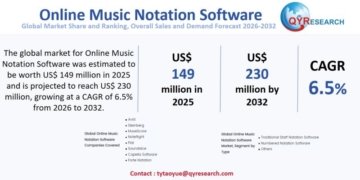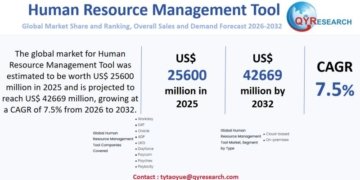✅Overview of the Data Quality Management Market
According to the latest study by Persistence Market Research, the Data Quality Management Market is set to experience robust growth through 2032. As businesses increasingly rely on data-driven decision-making, the demand for accurate, complete, and timely data has intensified. Data quality management (DQM) systems ensure that organizations maintain consistent, error-free, and actionable datasets across various departments, enabling improved analytics, compliance, and operational efficiency. From customer data to supply chain operations, businesses today realize that poor data quality can have a cascading effect on performance and profitability.
The market is experiencing significant traction due to increasing volumes of structured and unstructured data generated across industries. Enterprises are investing in DQM tools to enhance data governance, reduce regulatory risks, and gain a competitive edge. The BFSI segment is emerging as the leading sector due to the sensitive nature of financial data and stringent compliance requirements. North America remains the dominant geographical region, owing to its technological maturity, presence of leading vendors, and early adoption of data-driven technologies. The U.S. leads the charge with high investments in AI, big data analytics, and enterprise data infrastructure across sectors like finance, healthcare, and retail.
Get a Sample PDF Brochure of the Report (Use Corporate Email ID for a Quick Response): https://www.persistencemarketresearch.com/samples/21217
✅Key Market Insights
➤ Growing need for real-time data validation is pushing organizations to adopt automated DQM tools.
➤ Cloud-based data quality solutions are gaining momentum due to their scalability and lower upfront costs.
➤ Increasing adoption of AI and ML in data profiling, anomaly detection, and predictive cleansing.
➤ Stringent regulations like GDPR and CCPA are compelling organizations to improve data accuracy and transparency.
➤ Integration of DQM with data governance frameworks and master data management systems is expanding.
✅Why is data quality management important for business growth?
Data quality management is essential for business growth because it ensures the reliability and accuracy of the data used for strategic decisions. High-quality data leads to better customer insights, improved marketing effectiveness, streamlined operations, and reduced compliance risks. Poor data quality, on the other hand, can result in revenue loss, customer dissatisfaction, and operational inefficiencies. By investing in DQM, businesses can trust their data assets, enhance agility, and strengthen their competitive positioning in an increasingly data-centric world.
✅Market Dynamics
Drivers:
One of the primary drivers of the data quality management market is the rising demand for data-driven insights across industries. Organizations are leveraging big data, AI, and business intelligence tools more than ever before, but the value derived from these technologies is only as good as the quality of the underlying data. The growing number of data sources and interconnected systems is also compelling organizations to adopt advanced DQM solutions to ensure consistency and reliability across platforms.
Market Restraining Factor:
Despite its advantages, high implementation and maintenance costs associated with data quality solutions can deter small and medium enterprises from adopting them. In addition, the complexity of integrating DQM tools with legacy systems and existing data architectures can pose challenges during deployment.
Key Market Opportunity:
A significant opportunity lies in emerging markets and small enterprises that are digitizing their operations. Cloud-based DQM solutions present a cost-effective way for these organizations to adopt robust data management practices. Additionally, the rise of IoT and edge computing is generating new data streams that need real-time validation, further driving demand for agile and intelligent DQM tools.
✅Market Segmentation
The data quality management market is segmented based on component, deployment mode, enterprise size, end-use industry, and region. By component, the market includes software and services. Software dominates the market due to the increasing deployment of tools for data profiling, cleansing, enrichment, and monitoring. However, managed and professional services are gaining ground, especially among companies that seek third-party support for implementation and strategy development.
In terms of deployment mode, the market is bifurcated into cloud-based and on-premise. Cloud-based solutions are witnessing higher adoption, driven by scalability, cost-effectiveness, and ease of integration with modern IT infrastructure. When segmented by enterprise size, large enterprises hold the majority share due to their ability to invest in advanced data infrastructure. Nevertheless, SMEs are increasingly adopting DQM solutions to stay competitive and comply with data regulations. The market also sees segmentation by end-use industries, with banking, financial services, and insurance (BFSI) leading the pack, followed by healthcare, IT & telecom, retail, and government.
✅Regional Insights
Geographically, North America leads the data quality management market, driven by technological advancements, early adoption of AI and big data, and strict regulatory frameworks. The U.S. continues to be the most mature market, where both private and public organizations invest heavily in data integrity and compliance. Europe follows closely, with countries like Germany, the U.K., and France implementing GDPR-compliant data practices.
The Asia Pacific region is witnessing the fastest growth, especially in countries like China, India, and Japan, where digital transformation is in full swing. Growing startup ecosystems, increased cloud adoption, and regulatory reforms are fueling market expansion in this region. Latin America and the Middle East & Africa are gradually progressing, backed by increased government and private investments in digital infrastructure.
✅Competitive Landscape
The data quality management market is characterized by the presence of global software giants, specialized vendors, and startups offering AI-enabled data integrity solutions. Key players are focused on product innovation, partnerships, and strategic acquisitions to expand their market footprint and cater to evolving enterprise needs.
✅Company Insights
✦ IBM Corporation
✦ SAP SE
✦ SAS Institute Inc.
✦ Oracle Corporation
✦ Informatica
✦ Talend
✦ Syncsort (Precisely)
✦ Ataccama
✦ Experian plc
✦ Information Builders
✦ Pitney Bowes Inc.
For Customized Insights on Segments, Regions, or Competitors, Request Personalized Purchase Options @ https://www.persistencemarketresearch.com/request-customization/21217
✅Key Industry Developments
Major industry players are continuously enhancing their platforms to integrate AI and machine learning capabilities. In a recent development, Informatica unveiled its cloud-native Data Quality solution powered by the CLAIRE AI engine, enabling automated profiling, cleansing, and monitoring. SAP also announced improvements in its Master Data Governance suite to enhance data quality workflows and compliance.
Strategic collaborations are also shaping the market. IBM partnered with Salesforce to integrate data quality features into CRM workflows, while Experian launched real-time DQM APIs to support e-commerce and financial services providers. These developments indicate the increasing importance of embedding data quality directly into core business applications for seamless operations.
✅Innovation and Future Trends
The future of the data quality management market lies in AI-powered and autonomous data quality systems. Vendors are incorporating machine learning algorithms to automatically detect and correct anomalies, learn from past patterns, and adapt to new data types. Predictive data quality solutions that can anticipate errors before they occur are expected to become mainstream in enterprise environments.
Another innovation is the integration of DQM with data observability and analytics platforms, which provides a unified view of data health, lineage, and trust scores. As organizations continue to adopt hybrid and multi-cloud environments, there is a growing need for cross-platform DQM tools that can ensure consistency across disparate data systems. These innovations will make DQM a foundational component of enterprise digital strategies in the coming years.
✅Explore the Latest Trending “Exclusive Article” @
• https://www.linkedin.com/pulse/applicant-tracking-system-market-top-companies-strategies-flpvf/
• https://www.instagram.com/p/DLCL0AFxKy0/
• https://in.pinterest.com/pin/1049549888165960714
• https://x.com/prnewssync/status/1935242644302541004
✅Contact Us:
Persistence Market Research
G04 Golden Mile House, Clayponds Lane
Brentford, London, TW8 0GU UK
USA Phone: +1 646-878-6329
UK Phone: +44 203-837-5656
Email: sales@persistencemarketresearch.com
Web: https://www.persistencemarketresearch.com
✅About Persistence Market Research:
At Persistence Market Research, we specialize in creating research studies that serve as strategic tools for driving business growth. Established as a proprietary firm in 2012, we have evolved into a registered company in England and Wales in 2023 under the name Persistence Research & Consultancy Services Ltd. With a solid foundation, we have completed over 3600 custom and syndicate market research projects, and delivered more than 2700 projects for other leading market research companies’ clients.
Our approach combines traditional market research methods with modern tools to offer comprehensive research solutions. With a decade of experience, we pride ourselves on deriving actionable insights from data to help businesses stay ahead of the competition. Our client base spans multinational corporations, leading consulting firms, investment funds, and government departments. A significant portion of our sales comes from repeat clients, a testament to the value and trust we’ve built over the years.
This release was published on openPR.



















